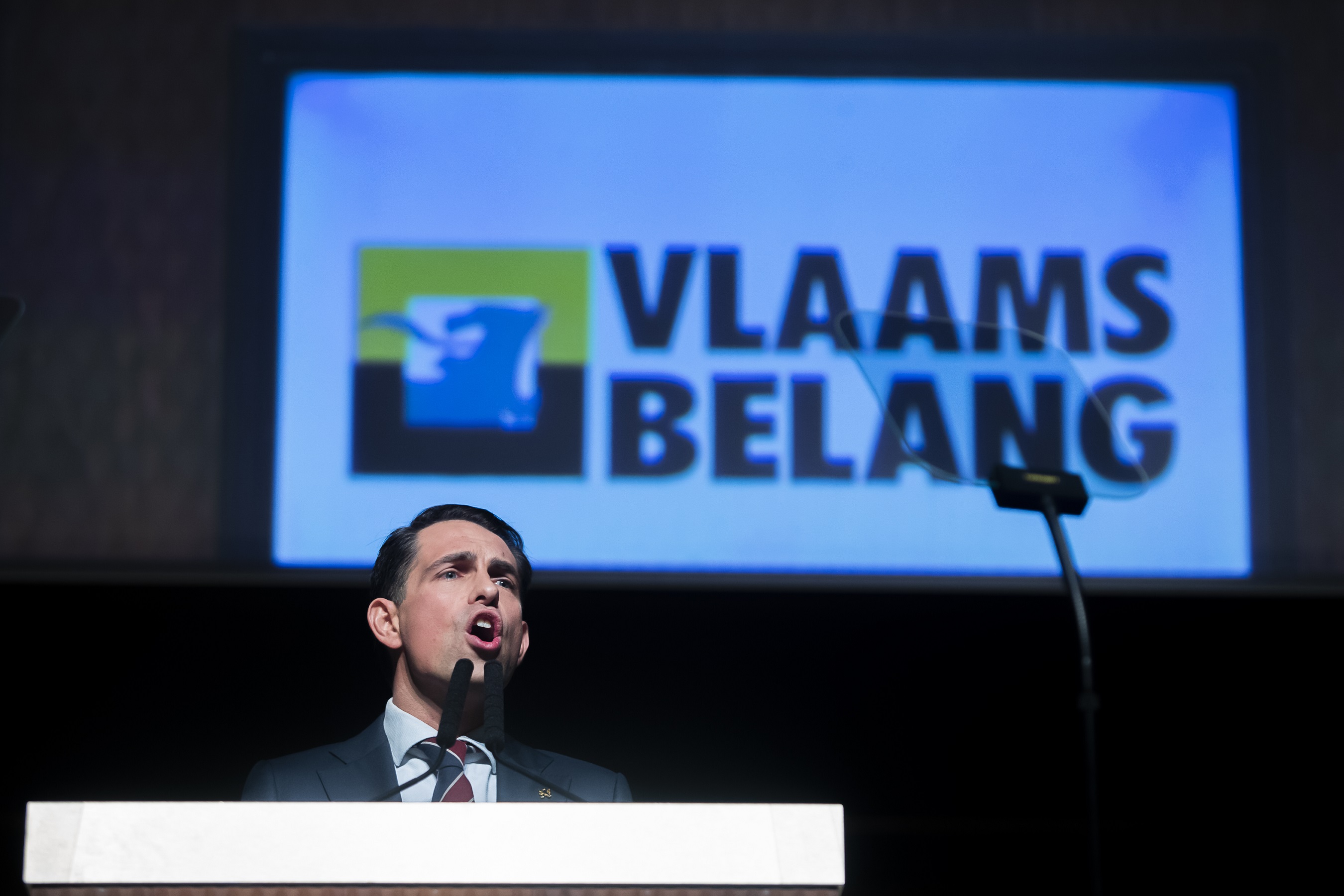If Tom Van Grieken gets his way, Belgium – as we know it – will cease to exist. Flanders will become an independent republic, with Brussels as its capital. The Belgian experiment, he declares, is over. “Belgium is a failed state,” he says. “We think about everything differently. And the Flemish pay for everything. We get a left-wing communist socialist government because the south decides in this country.”
This might seem fanciful, even ludicrous. However, Van Grieken’s views are popular. He leads the hard-right, anti-immigration party Vlaams Belang (Flemish Interest), which is currently the biggest political force in the country, with polls showing it has at least 25% of the Flemish vote. Belgian, regional and European elections are due on 9 June, and Van Grieken is hoping they will spark a Belgian divorce. His model would be the ‘velvet divorce’ of the Czech and Slovak republics in 1992-1993.
“Belgium is like a forced marriage: nobody asked for it,” the 37-year-old says over coffee at his party’s headquarters near the Madou metro station in Brussels. He sees the French-speakers in Wallonia as spongers who have nothing in common with industrious Flanders. “One goes to work every day and gives his money to the other. And in return, he gets no respect back and is treated badly,” he says.
If, as seems likely, Vlaams Belang emerges as the biggest Flemish party in the elections, he would seek a regional government coalition with the conservative N-VA party, that also wants Flemish independence. The Flemish parliament would then vote for a declaration of sovereignty, followed by negotiations with Belgium’s other politicians on how to separate. “It’s like a marriage. Who keeps the chairs?” he says. In this scenario, it leads to a separation agreement, followed by a declaration of independence.
Van Grieken’s scheme does not involve any direct consultation with voters through a referendum – and he accepts it would probably not pass if held today. But he says there will be an effective plebiscite through elections. “We have a Flemish Parliament, which is a legitimate parliament with the power of their full sovereignty,” he says, even though he admits the Flanders region’s formal powers are mainly in education and culture.
Even if he persuades the N-VA to join such an endeavour – a tall order as Bart De Wever wants a coalition with the liberal Open VLD and the conservative CD&V parties – he would still face a Belgian establishment that would likely refuse to negotiate their own demise. But he is undeterred. “Should the Americans ask the British Empire if it’s ok to become independent?” he asks. “Our plan is not less revolutionary.”
An independent Flanders would, he says, become a republic. “Kings and princes are for Walt Disney,” he says. And would Tom Van Grieken be its first president? “That's not my ambition,” he says, although not convincingly. “My ambition is to have a Flemish Republic, where we can fully live our Flemish identity. About titles, I couldn't care less.”
Brussels belongs to Flanders
What would happen to Brussels, which has at least four times as many native French speakers as Flemish, but is currently completely encircled by Flanders? Van Grieken is blunt: Brussels belongs to Flanders. “Brussels is from history a Dutch city,” he says. “It doesn't look very French, architecturally. Geographically, it lies in Flanders.”
Needless to say, such a claim would be fraught with huge obstacles, not just politically but also legally and constitutionally – and the city’s residents would be amongst object loudly to being annexed to a Flemish republic. But Van Grieken claims these are quibbles that can be overcome.
He lays out four scenarios for Brussels after a hypothetical Flemish independence. The first is to treat it like a special territory as the EU capital, like Washington DC, but he quickly dismisses it as “the most ridiculous one.” The second is to attach Brussels to Wallonia – they are only separated by a 4km band of Flanders in the Sonian Forest – but Van Grieken claims that would never work as "Wallonia and Brussels do not get on with each other." A third option would be an independent Brussels, but “it could survive a few years,” he says.
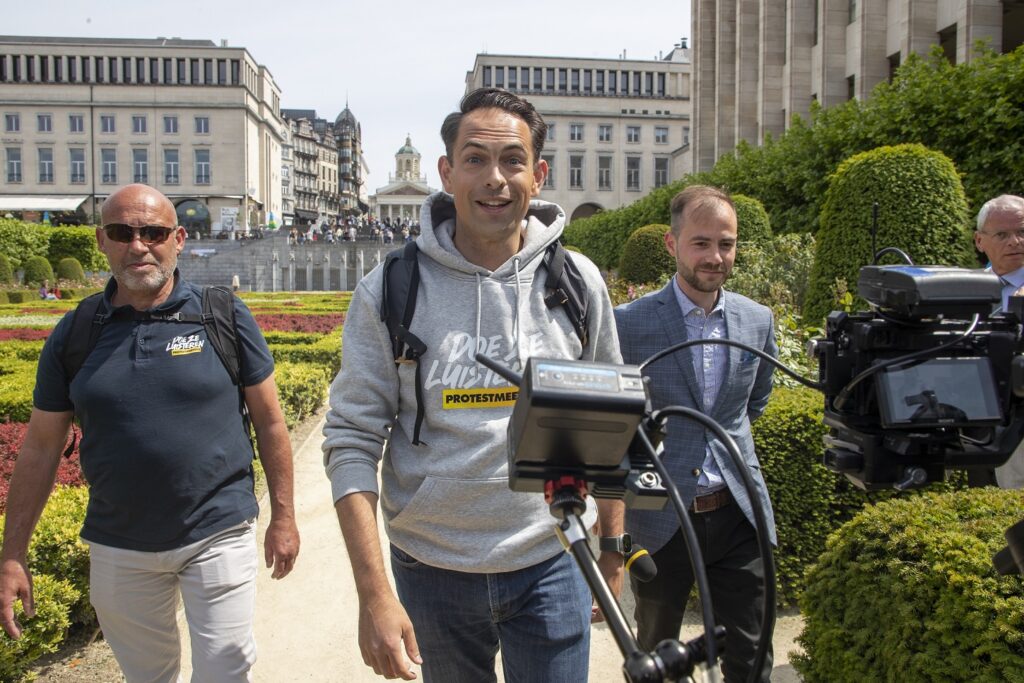
On a walkabout in Brussels
The final option, he says triumphantly, is Brussels as the bilingual capital of independent Flanders. “Let’s respect the French speakers. They have their rights,” he says. “We have an offer they cannot refuse. They don't have an airport. They don’t have access to the sea. It's a good offer. We are your capital; we respect your identity.”
His plan, he says, would treat French speakers better than francophone elites treated the Flemish in 19th century Belgium. “My grandparents were not allowed to have high education in the Flemish language. We had a long struggle,” he says.
Indeed, he likens Belgium’s colonial rule in Congo to that of Flanders. “The same bastards who treated the local population very badly, do you know which language they spoke?” he says. “Make no mistake, we had the same oppression. It was the same French-speaking bourgeois way to rule both Congo and Flanders.”
Nationalist or patriot?
In almost a decade as Vlaams Belang’s leader Van Grieken has done much to soften its toxic reputation as a hotbed of racism, intolerance and hatred. He is still very young, with a relaxed style (open-necked shirt, jacket and jeans in our interview) and an engaging, plausible manner. He doesn’t want to be labelled nationalist and prefers the word patriot. And he rejects any suggestion that Vlaams Belang is racist. “I don't like to be called a thief or rapist, because that's not true. So you cannot call me racist because I'm not,” he says.
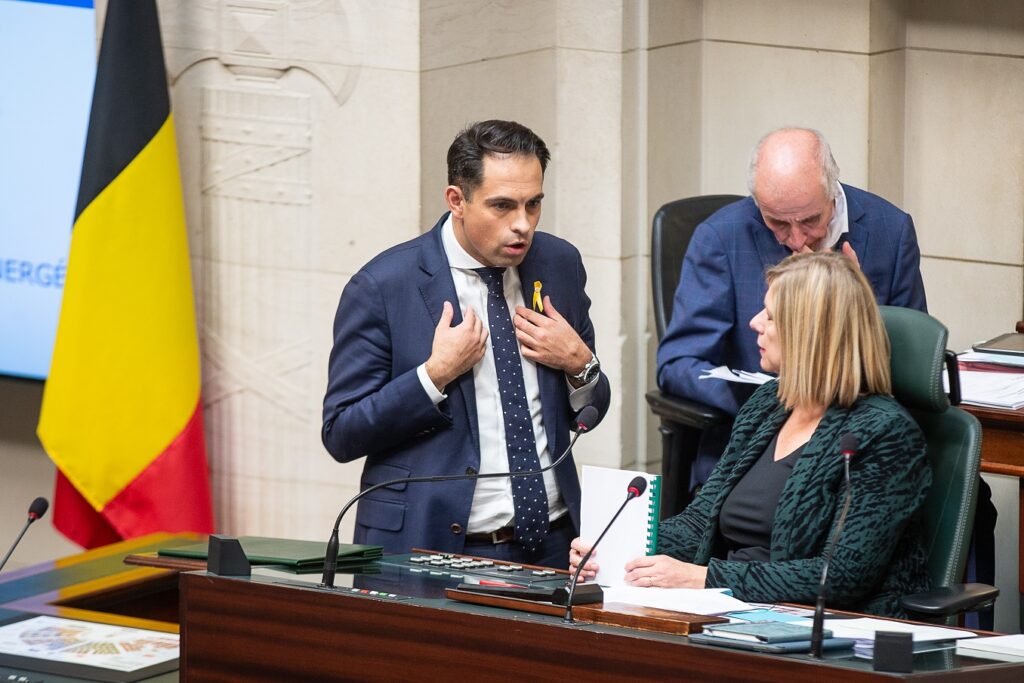
Remonstrating with Chamber chairwoman Eliane Tillieux
He rejects multiple reports of Vlaams Belang supporters waving swastikas or Nazi symbols, or chanting “Muslims are parasites” and insists they would be kicked out of the party if they did. “It's all guilt by association,” he says. He is currently taking Melissa Depraetere, the leader of the centre-left Vooruit party to court, for defamation and slander for calling him a racist.
And yet, for all Van Grieken’s denials, it is not hard to see why neo-Nazis and racists might be attracted by the Vlaams Belang creed that blames immigrants and the Belgian state for their woes.
Van Grieken does not merely want independence for Flanders. He wants to stop immigrants from coming to Flanders and even expel some of them. He argues that those fleeing war, famine or just seeking a better life are holding Flanders back. Vlaams Belang politicians describe immigration as “repopulation”, echoing the language of the controversial great replacement, a conspiracy theory which claims that ethnic white European populations are being replaced by non-whites with the complicity of elites.
Van Grieken bemoans “the loss of identity,” that “Belgium was the main supplier per capita for ISIS fighters,” and that some Brussels neighbourhoods “don't feel like they are Brussels.” And despite his previous guarding about guilt by association, he holds immigration responsible for crime, terrorism, joblessness and falling education standards in Flanders.
More sugar than coffee
He is not, however, universally opposed to migrants. Individuals can always fit in, he says, comparing them to sugar in his coffee. “You can put a sugar cube in it, and you stir it a bit. It makes your original coffee better. That's a little bit like migration. Nowadays, in the short period of few decades, they didn't put in one sugar cube, they put in 20.”
In his telling, migration is making Flanders unrecognisable. He claims schools are strained, with migrants dragging down education standards: apparently, they don't go to parent-teacher meetings and children don’t do homework.
“There will always be migration. But the amount we're facing is problematic…that's something you should worry about not only from an identity point of view but also an economic point of view,” he says. “We should stop mass migration as much as possible. With the people already here in Belgium, in Flanders, it doesn't matter where you're from, we will make the Flanders of tomorrow together.”
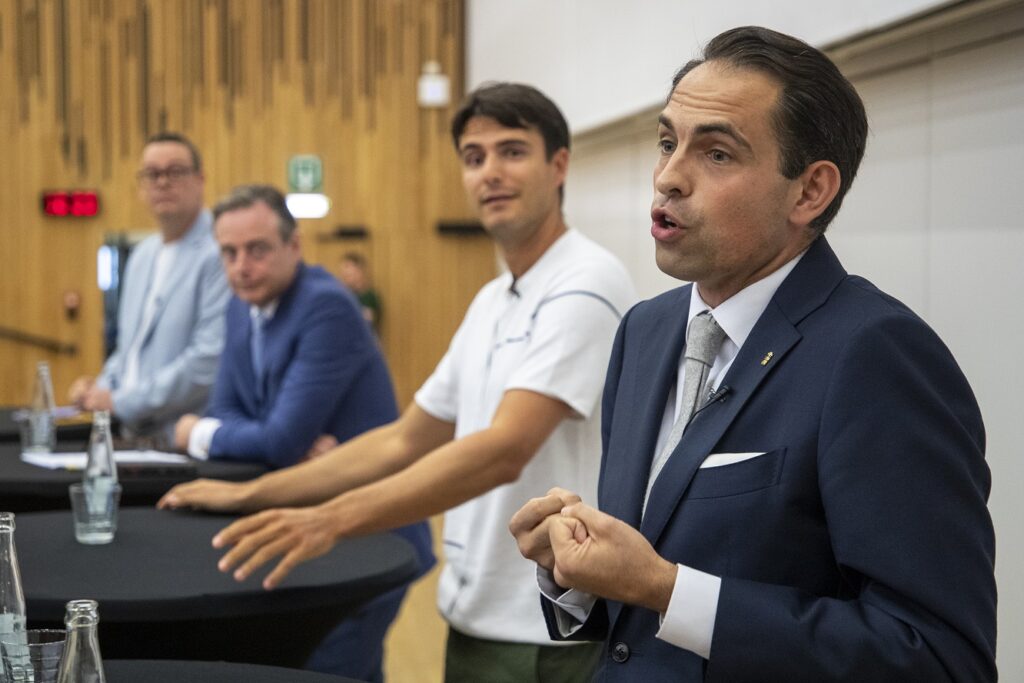
With PTB chairman Raoul Hedebouw, N-VA chairman Bart De Wever and Vooruit's chairman Conner Rousseau at a political debate
Van Grieken says one in three people in Belgium are of “foreign origin” – although that statistic includes naturalised Belgians and Belgians with a single non-Belgian parent.
Belgium’s population is currently 11.7 million and growing slowly. But without migration, it would shrink fast, as there are more deaths than births. An average of 160,000 come into the country every year and around 110,000 leave, leaving a net immigration balance of around 50,000. Voka, the Flemish employers' group says 50,000 migrant workers will be needed every year by 2030 to keep the economy going. However, Van Grieken says that without migration, the shortfall could easily be met by boosting birth rates through financial incentives – regardless of whether such ‘family-friendly’ policies reflect real social trends.
Mainstream the far-right
Belgium’s net migration rate in 2023 was just 2.056 per 1,000 people – hardly the “uncontrolled, mass immigration” Van Grieken describes. But Van Grieken’s language is gaining ground. Surveys show that Belgians and Europeans see migration as a priority and believe that authorities have failed to control it.
Extreme-right talking points increasingly dominate mainstream language about migration and diversity. Indeed, his wider politics of grievance have gained traction. While he might be bracketed into the broader sweep of populist politics, he reflects a growing sense that Flanders and Wallonia are drifting apart – and this dovetails with rising anti-immigrant sentiments.
He is not wrong when he says that the political centre of gravity in the richer, more trade-focused Flanders is on the right, while in Francophone Belgium, where Wallonia is still recovering from industrial decline, is more left-leaning. Beyond Belgian issues, many voters have legitimate fears about losing their jobs to offshoring, or new technology. In Flanders, many still see Belgian and indeed international institutions as self-serving and even arrogant, who are clinging to their privileges.
“What we want is not controversial anymore, being against mass immigration, Islamic extremists,” Van Grieken says. “It's not something to get freaked out about or something. It's not like we're against democracy or pro-violence.”
Still, Van Grieken would do more. He would deport three groups of “foreigners”: criminals, social security cheats (he claims 40% of all benefits claimants have “non-Belgium identity”), and radical Islamists. Many Vlaams Belang MPs have gone further and talk of kicking out all ethnic minorities
Van Grieken also won’t accept people with double nationality – not even his Dutch wife. He explains this by challenging me: who would I support if my two football teams, Belgium and England, play each other (which they did, in a friendly match on March 28)? When I respond, “It depends,” Van Grieken insists that I can only choose one. “You have to choose. You can be proud of your roots, where you come from. But you have to decide where your future lies. And if you keep your identity or nationality, where you come from, you will never fully go for your future,” he says.
He doesn’t support the Red Devils though, “because I don't like the Belgium nationality.” In the Euro 2024 tournament, he will be cheering for the Netherlands, a habit he started in 2004.
“I even had a little group. It's the Orange Club, the Flemish for the Dutch team,” he says. “The only thing Belgium politicians can brag about is the Belgium team. But they didn't win any title: if you’re going to talk, you need to deliver.”
Tone and substance
Van Grieken’s leadership represents a softer tone compared to previous versions of Vlaams Belang. The party’s origins lie in Volksunie (People's Union), a party that emerged in the 1950s to broadly advocate for greater Flemish autonomy. At its peak in 1974, Volksunie won a tenth of the seats in the Belgian parliament, but in 1979, a hardline faction spun off to form Vlaams Blok (Volksunie would eventually peter out in 2001, to be succeeded by N-VA).
Vlaams Blok not only demanded a "free and independent Flanders" but also railed against immigrants, using language and messages to demonise them. In the 1991 elections, Vlaams Blok secured a breakthrough, winning 12 seats in the-then 212-seat parliament, and overtaking Volksunie. This prompted all other parties to exclude them from any government in a cordon sanitaire.
Then, in 2004, Vlaams Blok was convicted of violating Belgium’s anti-racism law and was banned from taking part in elections. It was immediately dissolved itself and rebranded as Vlaams Belang.
Van Grieken would become its leader a decade later and worked to change the tone of the messaging, couching its more strident ideas in softer language. For example, in our conversation, he does not talk about deporting immigrants and other foreign-born people, but instead speaks about how “we will not build the Flanders of tomorrow” with them.
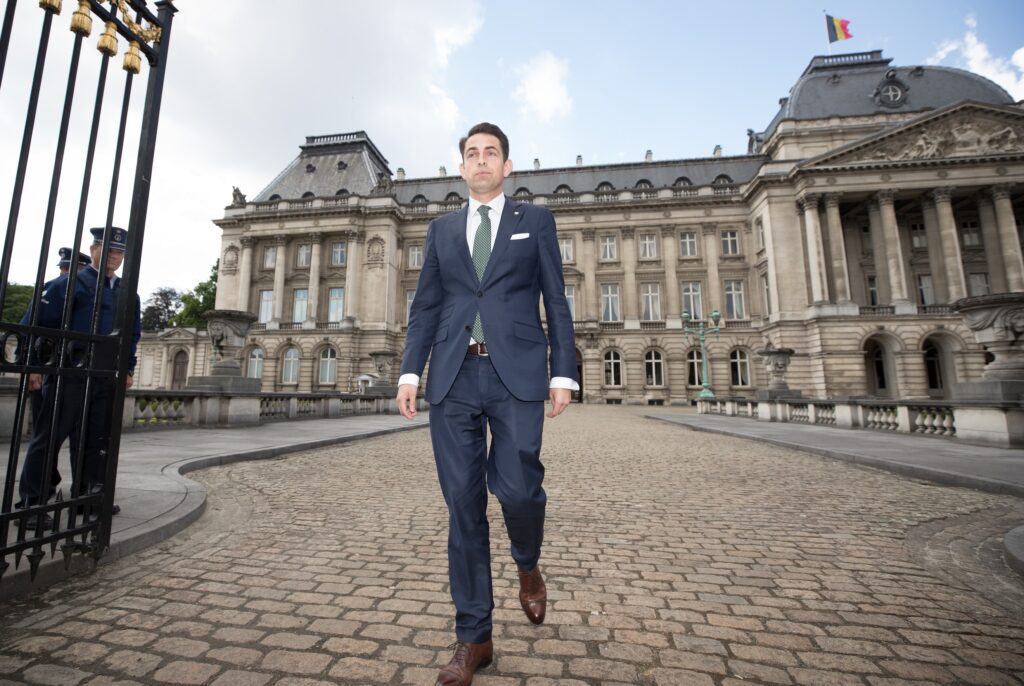
At the Belgian Royal palace as part of the King's consultations after the 2019 elections
The Vlaams Belang manifesto is blunter. It says, “open borders lead to higher crime rates, a disappearance of our already scarce open spaces and the import of Islamic values and norms...Flanders should no longer be the land of milk and honey for foreign fortune seekers who are not interested in our culture, but in our prosperity.”
Elsewhere, the manifesto lambasts the EU. “Flanders is now also becoming a billion-dollar supplier to the EU and southern European countries….The European superstate that shows no respect for democracy or public opinion.” It directly mentions European Commission President Ursula von der Leyen and former Belgian Prime Minister Guy Verhofstadt, saying they “want an EU empire: an EU governed by anonymous bureaucrats that swallows up more and more states and then replaces the nation states. The EU has become a technocratic monster.” And it calls for the abolition of the European Parliament.
There is also an entire chapter entitled ‘Woke’ where amongst other things they call “independent research of the presence of woke-ideologies in Flemish education” It follows Van Grieken’s promise, in a Tiktok video to present a bill this year threatening all “left-wing teachers who try to incorporate their multicultural nonsense into their lessons.” The Vlaams Belang youth wing has already set up a channel on its website for children to denounce teachers who use “left-wing language in the classroom.”
Background
How did Van Grieken get this way? There is little in his childhood that offers any obvious answer. The son of a policeman father and a shopkeeper mother, he grew up in prosperous Antwerp neighbourhoods, where, he says, he saw what happens when different communities live side by side. “I've seen the positive things about the multicultural environment, but also negative things,” he says, without elaborating.
As a teenager, he joined the right-wing student association NSV, then joined Vlaams Blok. He was elected a municipal councillor in Mortsel in 2007, youth president of Vlaams Belang in 2012 – around the same time he provocatively brought pork sausages to a halal barbecue at a school in Schoten – and became a member of the Flemish Parliament in 2014. The same year, when he was just 28, he was elected unopposed as Vlaams Belang leader.
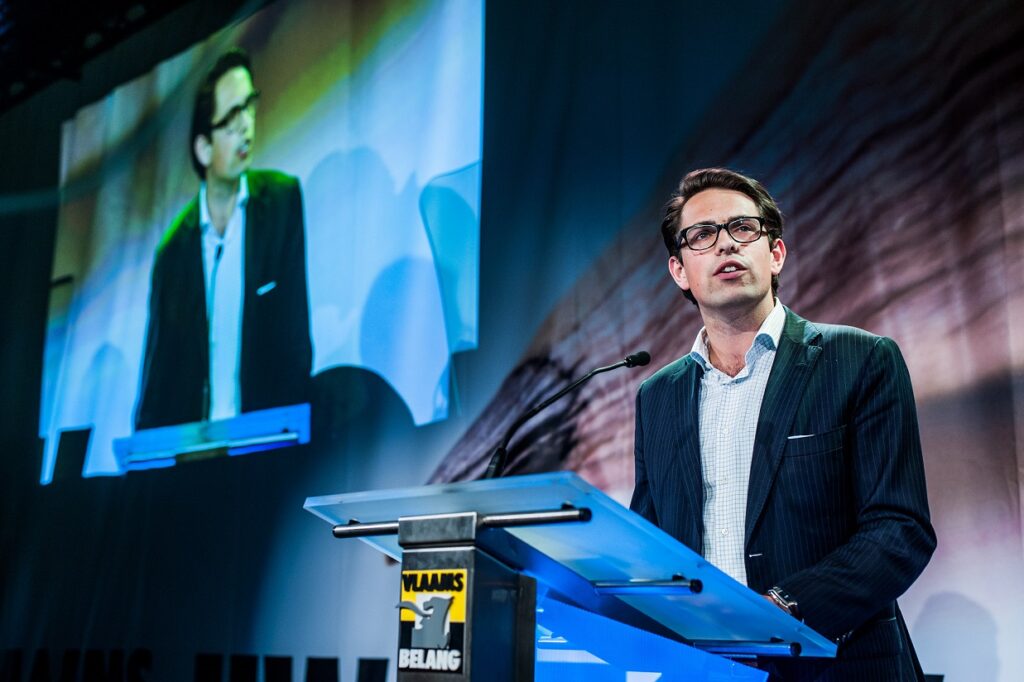
Speaking as newly elected leader in 2014
In the 2019 elections, Vlaams Belang won 18 seats in the 150-seat Chamber of Representatives – including Van Grieken – and during the government coalition talks afterwards, he was among the party leaders consulted by King Philippe, the first time since 1936 that a far-right leader had been invited to the Royal Palace.
Vlaams Belang was beaten into second place in 2019 by N-VA, which won 25 seats. Now the positions are reversed. Vlaams Belang proposed a joint candidate list with the N-VA for the Brussels region but was rejected. Van Grieken says N-VA leader Bart de Wever is “an intellectual who is at the end of his political career…He made the wrong tactical choices and now he must pay the price”. De Wever, on the other hand, calls Van Grieken a "buffoon".
Van Grieken also dismisses of Prime Minister Alexander De Croo, mocking his liberal Open-VLD party. “If you run the 100-metre sprint and you come seventh, you don't get the golden medal. In the elections, his party came seventh.”
Belgian parties have so far maintained their cordon sanitaire around Vlaams Belang, pledging not to govern with them. That also extends to media: MR leader Georges-Louis Bouchez, who debated Van Grieken on Flemish television in 2022, was reprimanded for doing so (Bouchez, Van Grieken says, is “a good debater talented, full of energy, but slippery, like an eel”).
Van Grieken lambasts the establishment for not speaking to him. “They're the last communist state in Western Europe, where the state television refuses to interview right-wing politicians andefuse debates. It's not a democracy,” he says.
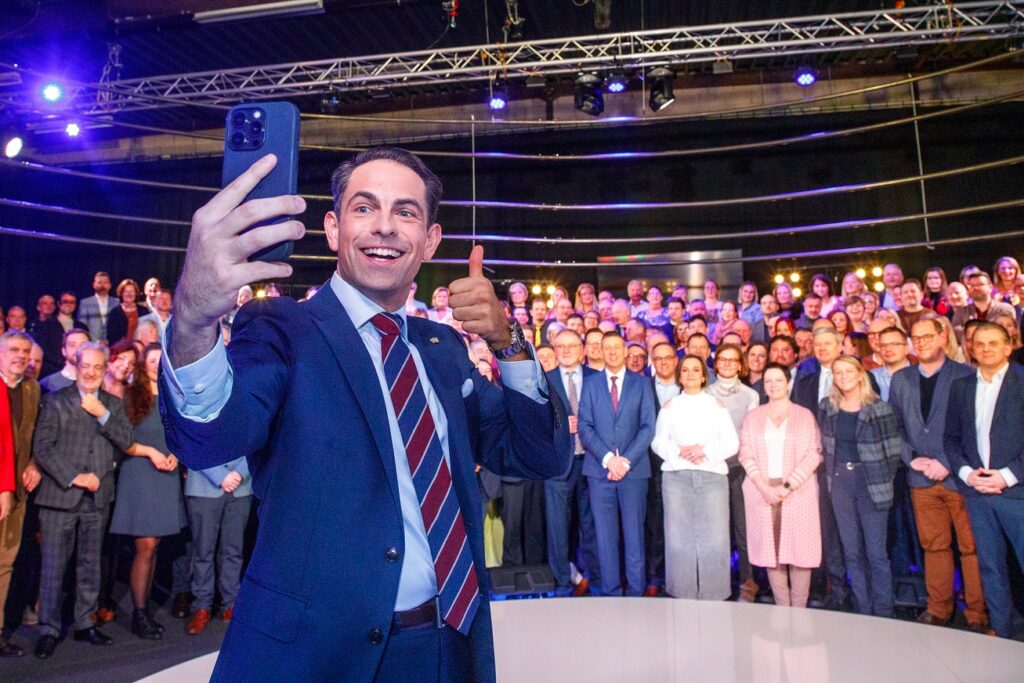
Selfie with party grandees
In any case, this attempt to starve him of the oxygen of publicity has not worked: Vlaams Belang is more popular than ever. He instead focuses his energy on reaching voters on Facebook, Instagram and TikTok. Critics say this allows him to indulge in public scaremongering, posting disinformation and stoking racial hatred.
In the meantime, he has not completely detoxified Vlaams Belang. In March, a Belgian court sentenced former Vlaams Belang MP Dries Van Langenhove to a year in prison for running an organisation that a judge said spread “racist, hateful, Nazi and negationist speech.”
And he still supports Filip Dewinter, a predecessor as Vlaams Belang leader, who is known for meeting Syria's dictator Bashar al-Assad, appearing as a guest speaker at the Russian parliament, and backing Greek neo-fascists Golden Dawn. Last month Dewinter was reported to have received payments both from a Chinese spy and from Voice of Europe, a pro-Kremlin, anti-Ukraine group.
Europe’s darkest times?
Turning to the EU, Van Grieken criticises its leaders. Ursula von der Leyen. “She represents a supernational structure which I disagree with,” he says. “We love Europe. But we have our doubts about the European Union…there was never, ever a clear discussion that we give away our sovereignty on political issues.”
He even likens the EU to Nazism. “When were Europe's darkest times? When somebody denied the identity of nations and wanted to make it one state, whether it was Napoleon, whether it was Hitler, whether the European Union,” he says.
He also opposes the EU’s Green Deal, “which is killing our industry completely.” While he accepts that climate change is happening, he says any solution will come from “technology, not fines and overregulation.”
When it comes to Ukraine and Russia, Van Grieken is not instinctively pro-Moscow, like many far-right politicians. “Putin is a bad guy…he is a warmonger. There's nothing good you can say about that. He's completely wrong,” he says. However, his solution is to effectively surrender Ukraine by suing for peace. “Our point of view is, we should end this conflict as quickly as possible,” he says.
And Van Grieken hopes to see Donald Trump back in the White House. “He's not my style of guy – I don't like ketchup with steak - but I think he's still the better candidate than Joe Biden,” he says. And despite their different styles, he is ready to learn from the former President. “For all the unrefined way that he talks, he got things done with his big mouth,” he says. Though Van Grieken is more careful about what he says, many would say that his underlying message will always be unrefined.

